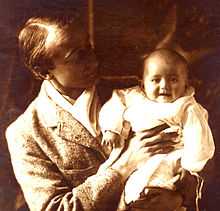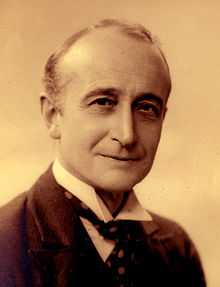Henry Meulen
Henry Meulen (1882–1978) was a British individualist anarchist and economist. He was an editor of the periodical called The Individualist, published by the Personal Rights Association and actively promoted the philosophy of free banking. He is the author of Free Banking: An Outline of a Policy on Individualism (London: Macmillan, 1934) and Individualist Anarchism (Glasgow: The Strickland Press, 1949).


Meulen's parents were born in the village of Kirchberg and emigrated to London c. 1870. His father (Friedrich Maullen) worked as a bookbinder and, though successful, could not afford to send his five children to university. Meulen went to the French school in Soho and then entered the competitive examination, with 400 other candidates, to join the Post Office. He obtained one of the seven available places and because of his fluency in French and German went to work in the Central Telegraph Office. In 1910 he set up home with Violet Middleton in Bedford Park. His only daughter, Paula Meulen (later Paula Turner, wife of Richard Wainright Duke Turner), was born in 1911 and Violet died in childbirth. Meulen had become interested in currency reform and began work on his first book Industrial Justice through Banking Reform. An outline of a policy of individualism. The book was nearly finished when, in 1916, he was conscripted and sent to France in a labour battalion (because of his German parentage). When his musical talent was discovered he joined a concert party known as the All Stars. Meulen changed the spelling of his family name from Maullen to Meulen because the family were originally from the Low Countries and, he thought, related to Antony Francis van der Meulen. Originally Protestant, the family was displaced in the Thirty Years War and sceptical thereafter. He thought of himself as a seventh generation atheist.
When demobbed after the First World War, Meulen felt that too much of his life had been spent working for the government. He had seen many inefficiencies and developed an enthusiasm for role of entrepreneurship and private enterprise in an economy. A friend from his debating society (McKenzie) suggested starting a business which would import manufactured goods from Germany. Meulen, whose German was excellent, travelled as a buyer. The trading name of the business was Cairns and Company, operating from Hammersmith in West London. It was successful, but the two friends lost most of their money when the German papiermark collapsed in 1923. This experience gave Meulen a deep-seated distrust of any government's ability to manage a currency and inspired him to start work on Free Banking: An Outline of a Policy on Individualism. The book has a study of the Scottish banking system and of the circumstances leading to what he regarded as the fateful passage of Bank Charter Act 1844. Meulen believed that the monopoly of note issue obtained by the Bank of England was a disaster for Britain and that the evil consequences of this monopoly spread round the world, causing economic depressions, revolutions, a loss of individual liberty and the agglomeration of power by governments. Towards the end of his life Meulen became a great admirer of Margaret Thatcher and hoped that she would roll back the power of the state. He died eight months before her first election victory.
See also
- Friedrich Hayek, also supported free banking
References
- Meulen, Henry. Banking and the Social Problem. 1909
- Meulen, Henry. Free banking. 1934.
- Meulen, Henry. Free Banking. An outline of a policy of individualism. 1934
- Meulen, Henry. Individualist Anarchism (Reprinted from “The Word,” November, 1949. With a portrait.) 1949
- Meulen, Henry. Industrial Justice through Banking Reform. An outline of a policy of individualism. 1917
- Dowd, Kevin. The monetary economics of Henry Meulen. 1988.
- The price of gold. By T. Goeritz and H. Meulen. 3rd ed. 1972
External links
- Part I of Instead of a Magazine Correspondence between Beckerath and Muelen Part II Part III Part IV Part V Part VI edited by John Zube
|